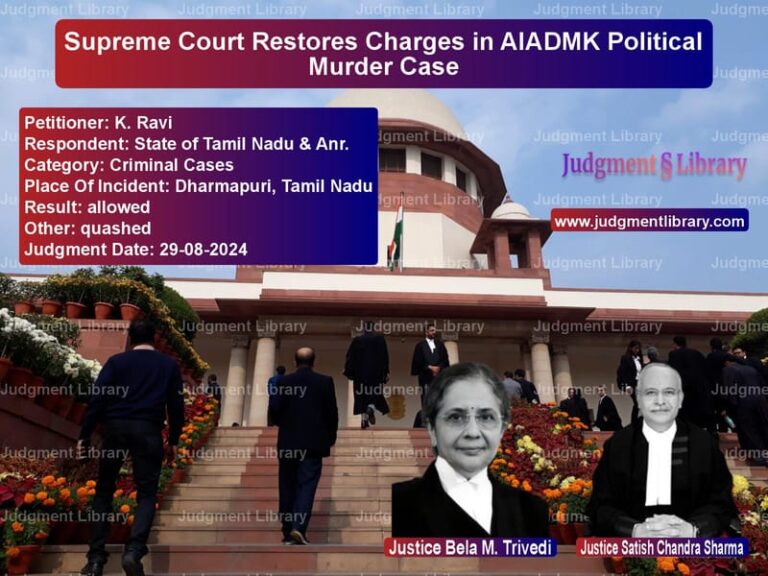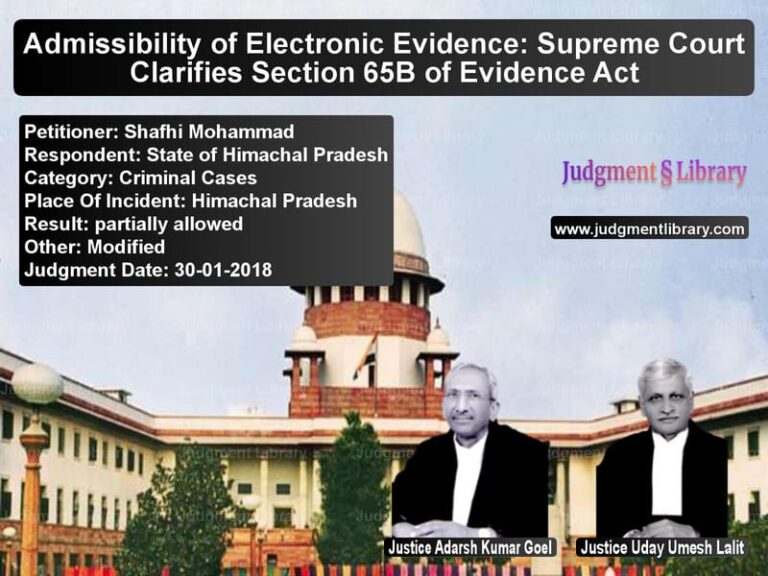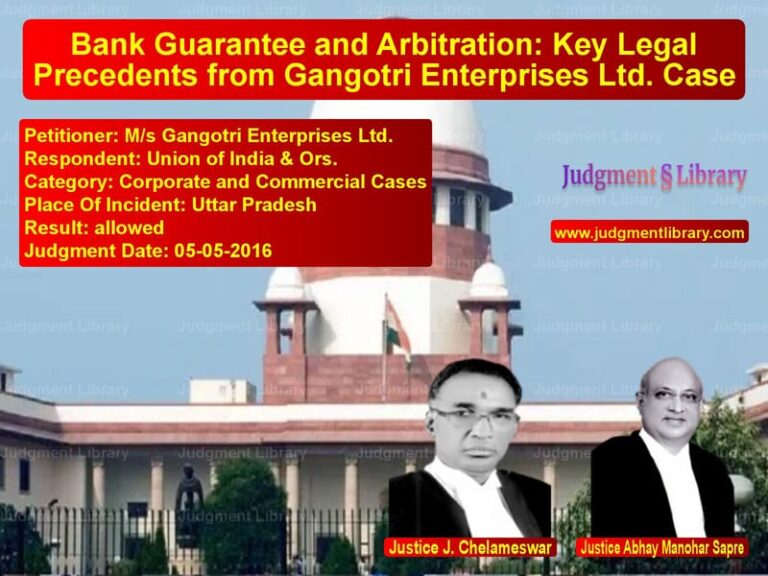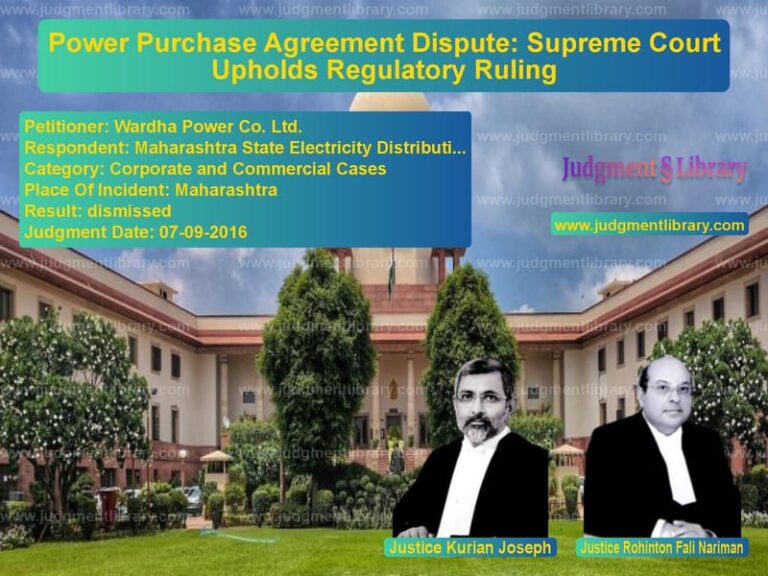CBI vs. R.R. Kishore: Supreme Court’s Landmark Ruling on Section 6A of the DSPE Act
The case of CBI vs. R.R. Kishore raised significant legal questions about the retrospective application of a Supreme Court decision declaring Section 6A of the Delhi Special Police Establishment (DSPE) Act, 1946 unconstitutional. This section required prior approval from the Central Government for investigating senior government officials in corruption cases. The Supreme Court was called upon to decide whether its earlier decision in Subramanian Swamy vs. Director, CBI, which struck down Section 6A, should apply retrospectively.
The ruling carries profound implications for corruption investigations, particularly those conducted without prior approval under Section 6A. The case also highlights the balance between protecting bureaucrats from frivolous prosecution and ensuring accountability for corruption.
Background of the Case
The appellant, the Central Bureau of Investigation (CBI), registered an FIR against Dr. R.R. Kishore on December 16, 2004, under the Prevention of Corruption Act, 1988. The CBI laid a trap in the evening of the same day and alleged that the respondent had accepted a bribe to protect a radiologist conducting illegal pre-natal sex determination tests in violation of the Pre-Natal Diagnostic Techniques (Regulation and Prevention of Misuse) Act, 1994.
The respondent moved for discharge, arguing that the trap and subsequent investigation were illegal as they were conducted without prior approval from the Central Government, as required under Section 6A of the DSPE Act. The Special Judge, CBI, rejected this argument, but the Delhi High Court later ruled in favor of the respondent.
High Court’s Decision
The Delhi High Court framed three key questions:
- What is the background of Section 6A of the DSPE Act?
- Did the CBI act in contravention of Section 6A(1)?
- If yes, does it mean that the entire trial is vitiated?
The High Court ruled that the investigation violated Section 6A and was thus illegal. It allowed the competent authority to reinvestigate and seek approval, but if approval was not granted, the case had to be closed. The CBI, aggrieved by this ruling, appealed to the Supreme Court.
Key Legal Issues
The Supreme Court was called upon to determine whether the declaration of Section 6A’s unconstitutionality should apply retrospectively. This required examining the nature of procedural safeguards, the applicability of Article 20(1) of the Constitution (which protects against ex post facto laws), and whether the ruling in Subramanian Swamy affected past cases.
Arguments Presented
CBI’s Arguments
The CBI, represented by Solicitor General Tushar Mehta, argued that:
- Section 6A was a procedural provision, not a penal one, and thus did not attract Article 20(1) protections.
- Article 20 applies only to laws that create or enhance criminal liability, not procedural safeguards.
- Once a law is declared unconstitutional, it is void ab initio (invalid from inception).
- Allowing Section 6A to remain applicable post-2014 would nullify investigations conducted without prior approval.
- The High Court erred in ruling that the investigation was illegal.
Respondent’s Arguments
Dr. R.R. Kishore, appearing in person, argued that:
- The CBI’s investigation was illegal under Section 6A and should be quashed.
- The Delhi High Court’s ruling was correct in requiring prior approval.
- Applying the Subramanian Swamy ruling retrospectively would violate his legal protections.
- Retrospective application of the ruling would create discrimination against those who had already benefited from Section 6A.
Supreme Court’s Ruling
The Supreme Court ruled that:
- Section 6A was procedural and did not fall under the protections of Article 20.
- When a law is declared unconstitutional, it is considered void ab initio.
- Investigations conducted without prior approval under Section 6A are not automatically invalid.
- The declaration in Subramanian Swamy applies retrospectively.
- Section 6A of the DSPE Act was unconstitutional from the date of its insertion (September 11, 2003).
Legal Precedents Considered
The Court relied on precedents including:
- Rao Shiv Bahadur Singh vs. State of Vindhya Pradesh – which held that procedural changes do not attract Article 20(1).
- Behram Khurshed Pesikaka vs. State of Bombay – which clarified that unconstitutional laws are unenforceable.
- Deep Chand vs. State of Uttar Pradesh – which reinforced that unconstitutional laws are void from inception.
Impact of the Judgment
This ruling has far-reaching consequences:
- All investigations conducted without prior approval under Section 6A are now valid.
- Government officials cannot claim immunity under Section 6A in corruption cases.
- Pending cases relying on Section 6A will proceed without requiring government approval.
- The ruling strengthens anti-corruption mechanisms and ensures accountability.
Conclusion
The Supreme Court’s decision in CBI vs. R.R. Kishore reaffirms that procedural safeguards do not grant immunity from prosecution. The ruling ensures that corrupt officials cannot escape accountability by citing procedural technicalities. By applying the ruling retrospectively, the Court upheld the principle that unconstitutional laws cannot be allowed to shield wrongdoing.
Petitioner Name: CBI.Respondent Name: R.R. Kishore.Judgment By: Justice Vikram Nath, Justice Sanjay Kishan Kaul, Justice Sanjiv Khanna, Justice Abhay S. Oka, Justice J.K. Maheshwari.Place Of Incident: Delhi.Judgment Date: 11-09-2023.
Don’t miss out on the full details! Download the complete judgment in PDF format below and gain valuable insights instantly!
Download Judgment: cbi-vs-r.r.-kishore-supreme-court-of-india-judgment-dated-11-09-2023.pdf
Directly Download Judgment: Directly download this Judgment
See all petitions in Bail and Anticipatory Bail
See all petitions in Fraud and Forgery
See all petitions in Extortion and Blackmail
See all petitions in Judgment by Vikram Nath
See all petitions in Judgment by Sanjay Kishan Kaul
See all petitions in Judgment by Sanjiv Khanna
See all petitions in Judgment by Abhay S. Oka
See all petitions in Judgment by J.K. Maheshwari
See all petitions in dismissed
See all petitions in supreme court of India judgments September 2023
See all petitions in 2023 judgments
See all posts in Criminal Cases Category
See all allowed petitions in Criminal Cases Category
See all Dismissed petitions in Criminal Cases Category
See all partially allowed petitions in Criminal Cases Category







